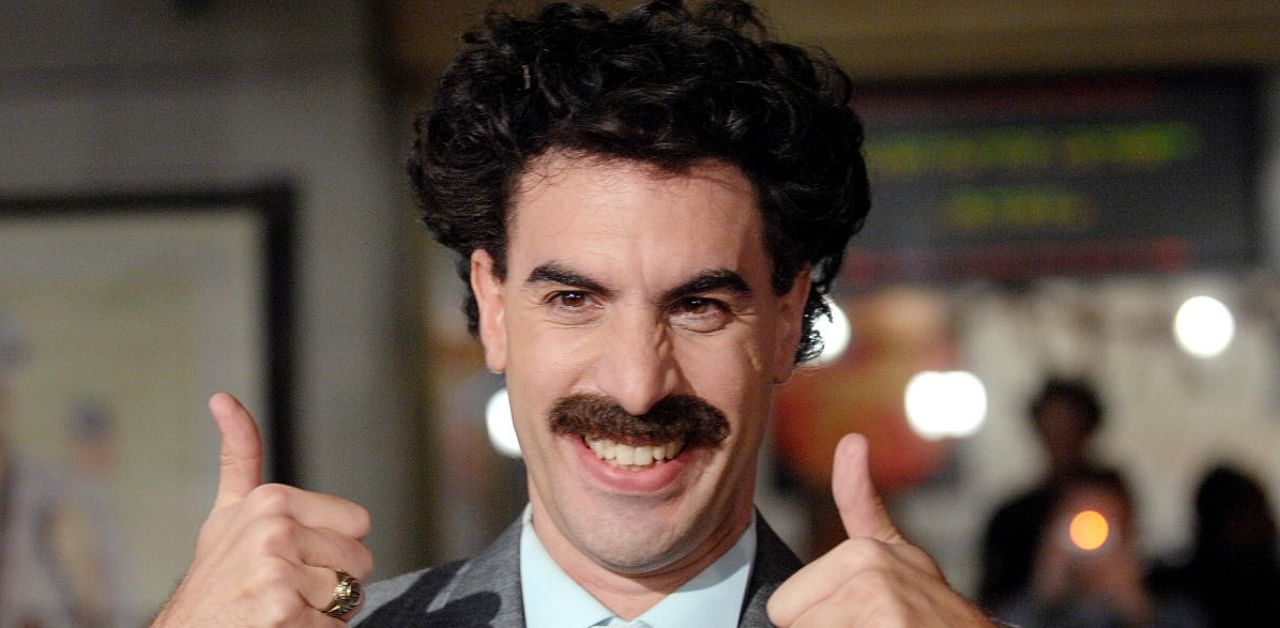
Depending on who you ask, the character of Borat, played by Sacha Baron Cohen, is either extremely funny or a crass creation that needs to be “cancelled”.
But even though the first movie, ‘Borat: Cultural Learnings of America for Make Benefit Glorious Nation of Kazakhstan’, the story of the obnoxious eponymous east-European journalist reporting on America, was a critical hit, few people thought about its innovations of form. They must not be blamed; too many people were fighting about what the film was saying that conversations on craft could wait. Perhaps a discussion of the film’s controversies is, in fact, a matter of priority.
Borat 1 was released in 2006, towards the end of the George W Bush presidency and was an attempt to lampoon the prejudices many Americans held.
More respectable satires, both then and now, took the liberal route of mocking those in power and not making jokes about those without privileges. So, it was difficult to laugh at Borat’s terrible thought process, whether were are conservative or liberal. The blatantly anti-semitic ‘Running the Jew’ gag was surely placed ironically, as Cohen himself is a Jewish person fluent in Hebrew, but was it okay to laugh?
It was this same discomfiting humour that Cohen used when choosing Kazakhstan as Borat’s home country. He needed a dummy country, a fictional cesspool of anti-semitism, racism, illiteracy and misogyny, but instead of creating an Absurdistan or a Wakanda to suit his purposes, he picked an actual country and fictionalised it. It makes you wonder: Is that allowed? The answer is no. But by doing so, Cohen demonstrated that giving offence does not mean the sky is going to fall down.
2006’s Borat may even be ahead of our own times. In 2020, cancel culture is still going strong, but Borat is politically incorrect with such sheer intensity that any outrage against him may feel insufficient. It is fun to wonder what our fellow countrymen would have done if Cohen had named Borat’s fictional country ‘India’. Sections of our social media outrage and abuse when any of our cultural figures and natural treasures are slighted; would we have been able to handle it if Cohen would not produce even a pretence of an apology?
It would not be far-fetched to claim that the film’s tendency to provoke was part of its formal inventiveness. Detractors may say that to be contrarian is not inventive in itself. That is a fair point. But Cohen, and director Larry Charles, took the movie to real-life people recording their sham theories and terrible opinions.
Many writers categorise ‘Borat’ as a mockumentary (Even the Wikipedia entry for ‘mockumentary’ proudly claims ‘Borat’ as one of its own), but this description does not do justice to all that the film achieves.
Mockumentary mostly refers to works like the show ‘Modern Family’, where fictional characters participate in a documentary in that particular universe. Many people you see speaking in ‘Borat’, on the other hand, are airing their honest views believing Borat to be a journalist from Kazakhstan. So, ‘Borat’ is docufiction, unlike it has ever been done before.
The second Borat movie (titled ‘Borat Subsequent Moviefilm: Delivery of Prodigious Bribe to American Regime for Make Benefit Once Glorious Nation of Kazakhstan’), which released on Amazon Prime Video this week and is probably the most discussed film in the world today, is a little less searing than the first, but goes even further in some other ways.
Bad news first: It is not as funny as its predecessor. Not that the humour doesn’t hit the same pitch as the first film, but it does so far fewer times. However, the film manages to bring actual political figures such as US Vice President Mike Pence and Trump’s lawyer and former New York Mayor Rudy Giuliani into its narrative.
We are in 2020 when the second movie begins, and Borat, after being imprisoned for many years as a sentence for making the first film, is let out, and with the intention of getting Kazakhstan “McDonald Trump’s” respect, decides to present a monkey to the Vice President.
When it turns out that his daughter ate the monkey, Borat decides to present the girl instead. However, after Pence rejects the offer of the girl, he decides to give her to Giuliani. That 76-year-old Giuliani is flirting with the 24-year-old actor (her character is a teen) when they meet is obvious, but in a scene that is now controversial, the man puts his hand in his pants and allegedly touches his “charm”. Borat 2 is pushing the envelope here. Not just with regard to freedom of speech and what cinema can do to save democracy, but how the form of cinema itself can be moulded. It would be a truism to say Borat is a political film; a more careful observation would say it is an election film. The humour of the Borat films makes the most sense in the panic and polarisation that a national election can create. The first movie came out in the run-up to the 2008 US election that elected Barack Obama, at a time when American imperialism under George W Bush was in full swing.
What Borat 1 was to the 2008 election and Bush, Borat 2 is to the 2020 election and Trump. This may explain why Borat 2 comes so long after Borat 1. This is also why predicting when Borat 3 would come is hard. How wrong would we be to say Borat will make his next film appearance when democracy collapses into a conservative black hole the next time?